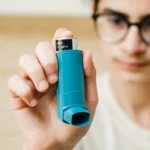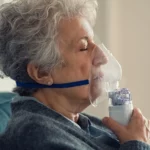Can Asthma Develop in Your 30s? – Here’s What You Need to Know
Wondering if asthma can develop in your 30s? Turns out, it’s more common than you think! Let’s talk about how asthma might show up later in life and what you can do if it happens to you.
A lot of people think asthma is something that kids deal with, but that’s not always the case. In fact, asthma can pop up in your 30s, even if you’ve never had it before. If you’re suddenly struggling with shortness of breath, wheezing, or chest tightness, you might be wondering if it’s just a passing thing—or if it’s time to get checked for asthma. So, let’s dive into it. Can asthma really develop in your 30s? And what does it mean for your health?

What is Asthma?
Before we get into the nitty-gritty of adult-onset asthma, let’s talk about what asthma actually is. Asthma is a condition where your airways become inflamed and narrow, making it harder to breathe. Symptoms can include coughing, wheezing, shortness of breath, and chest tightness. It’s something that affects your lungs and can really mess with your daily life if not managed well.
Can Asthma Develop in Your 30s?
You might think that asthma is something you either grow out of as a kid or just never get it in the first place. But that’s not always true. Asthma can develop at any age—even in your 30s or later. This is known as adult-onset asthma, and it’s actually more common than people realize. In fact, studies show that a significant number of people who are diagnosed with asthma as adults are in their 30s or 40s.
So, yes—if you’re in your 30s and you’re starting to notice wheezing, coughing, or even trouble breathing during exercise, it’s totally possible that asthma could be the culprit.

Why Does Asthma Develop in Your 30s?
There’s no one-size-fits-all explanation for why asthma shows up later in life, but there are a few factors that can contribute to adult-onset asthma. These include:
- Environmental Triggers: If you move to a new area with different allergens or pollutants, your body might react to those triggers with asthma-like symptoms. Pollen, dust, pet dander, or even air pollution could set off an asthma flare-up.
- Respiratory Infections: Sometimes, a bad cold or respiratory infection in your late 20s or early 30s could trigger asthma symptoms. It’s like the infection irritates your airways, and they don’t fully bounce back afterward.
- Changes in Hormones: Hormonal fluctuations (like those during pregnancy, perimenopause, or just normal life changes) can sometimes make you more prone to developing asthma. Women, especially, may experience this more often as they get older.
- Genetics: If asthma runs in your family, you might be more likely to develop it as an adult. It’s a genetic thing, but it doesn’t always show up when you’re young.
Symptoms of Adult-Onset Asthma
If you think you might be dealing with asthma, you’ll want to watch out for the following symptoms:
- Wheezing: That high-pitched whistling sound when you breathe? Yeah, that’s a big sign of asthma.
- Shortness of breath: You might feel out of breath, especially after exercise or when you’re exposed to allergens.
- Coughing: Especially at night or early in the morning, a persistent cough can be a key symptom.
- Chest tightness: That feeling like something is sitting on your chest, making it hard to breathe.
If these symptoms seem familiar, it might be time to see a doctor and get a proper diagnosis.
How is Adult-Onset Asthma Diagnosed?
If you’re experiencing any of the symptoms mentioned, your doctor will probably do a few tests to figure out what’s going on. This might include:
- Spirometry: A test where you breathe into a machine to measure how much air you can inhale and exhale. This helps doctors see how well your lungs are functioning.
- Peak Flow Test: This measures how fast you can exhale air from your lungs. It can give doctors an idea of how restricted your airways are.
- Allergy Testing: If allergies are triggering your asthma, this test helps doctors pinpoint what’s causing the issue.

Treatment Options for Asthma in Your 30s
If you get diagnosed with asthma in your 30s, don’t panic! Asthma can be managed with the right treatment. Some common treatments for adult-onset asthma include:
- Inhalers: These are a go-to for asthma treatment. They can be either quick-relief (rescue) inhalers to help you breathe during an asthma attack, or long-term control inhalers to prevent flare-ups.
- Steroids: If inflammation is a big issue, your doctor might prescribe oral or inhaled steroids to reduce swelling in your airways.
- Lifestyle Changes: You might be advised to avoid triggers like smoking, air pollution, or allergens. It’s also helpful to maintain a healthy weight and exercise regularly, but in a way that doesn’t trigger asthma symptoms.
Is Adult-Onset Asthma Permanent?
Adult-onset asthma can be lifelong, but with the right treatment and lifestyle changes, you can manage it. Some people find that their symptoms improve over time, especially if they’re able to avoid triggers and stay on top of their medications. But for others, asthma can be a chronic issue that requires lifelong care.
Can You Prevent Asthma in Your 30s?
While there’s no surefire way to prevent asthma from developing, there are things you can do to lower your risk:
- Avoid triggers: Stay away from allergens, pollution, and other things that irritate your lungs.
- Quit smoking: If you smoke, quitting is one of the best things you can do for your lung health.
- Exercise: Regular, moderate exercise can help keep your lungs in good shape. Just be sure to warm up properly and avoid triggering asthma symptoms during workouts.

Conclusion
So, to answer the big question—yes, asthma can totally develop in your 30s. If you’re dealing with any symptoms like coughing, wheezing, or shortness of breath, it’s definitely worth checking in with a doctor to figure out if asthma is behind it. With proper diagnosis and treatment, you can manage adult-onset asthma and still live a full, active life.
Appendices
FAQs
- Can asthma develop suddenly in your 30s? Yes, adult-onset asthma can develop suddenly or gradually, especially if you’re exposed to new environmental triggers or respiratory infections.
- What are the signs of adult-onset asthma? Look out for symptoms like coughing, wheezing, shortness of breath, and chest tightness, especially if they’re new or unusual for you.
- Can stress make asthma worse in your 30s? Yes, stress can trigger or worsen asthma symptoms. Learning to manage stress through relaxation techniques can help.
- Can asthma be cured once you’re diagnosed? Asthma is a chronic condition, and while it can’t be cured, it can be effectively managed with medication and lifestyle changes.
- How does adult-onset asthma differ from childhood asthma? Adult-onset asthma often develops after age 20, and its triggers may be different. Childhood asthma tends to be more related to genetics and allergies, while adult-onset may be triggered by environmental factors or respiratory infections.
References
- American Lung Association (2024). Asthma in Adults: Diagnosis and Treatment. Read More
- Mayo Clinic (2023). Adult-onset Asthma: What You Should Know. Read More
- National Institutes of Health (2023). Asthma: Risk Factors and Treatment Options. Read More
Disclaimer
The information provided in this article is for general educational purposes and does not substitute for professional medical advice. Always consult a healthcare provider for advice on asthma or any medical condition.














